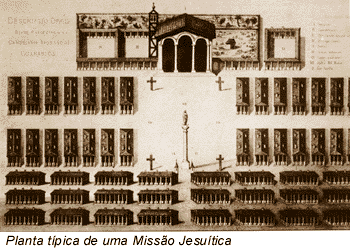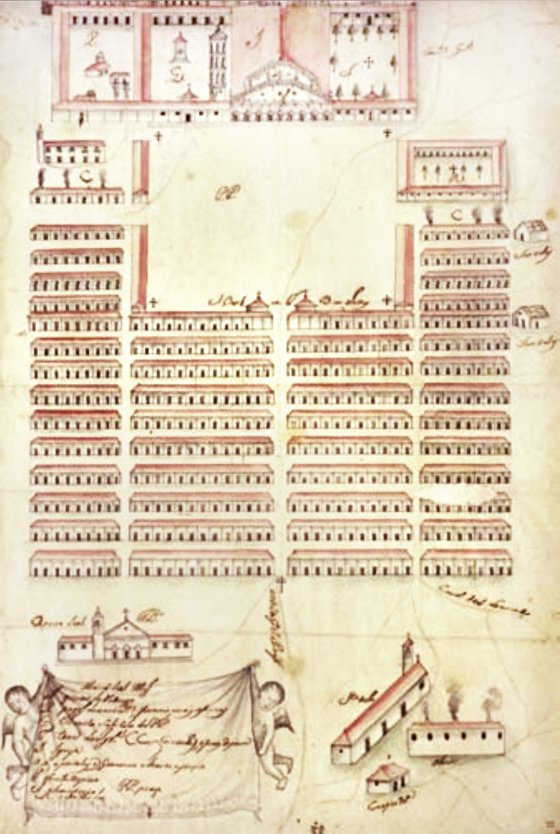Aldeamentos de Portugal
“Aldeia” in Portuguese means ‘village’ (settlement smaller than “vila”/’town’); "-mento" means that it was created by external authority, to impose control upon inhabitants. The legal concept of “Aldeamento” exists in 2024 in Portugal only to prop-up a corrupt elite: An instrument of power - to enhance economic inequality, impose social stratification and legalise extortion. The guise of elite ‘authority’ has transitioned since 16th century: Catholic Church → Salazar dictatorship → organised mafias. In colonisation and war its victims were Amerindian and African natives, whilst in Portugal today its victims include ordinary working citizens (who cannot afford a home) and foreign retirees (who can but are scammed).
In mid-16th century Brazil, "aldeamento" had the exclusive meaning of a Portuguese-administered Amerindian settlement under missionary control. It had the purpose of Christian indoctrination for obliteration of native culture, forcing Tupi people to abandon their long houses, polyamory, shamanism and nakedness and to build houses for single, nuclear families. When forced to live in “aldeamentos”, the Tupi also became a handy source of labour so were turned into slaves for coastal estates. From an estimated population of 1 million in 1500 C.E., the Tupi were almost completely annihilated by this disruption to their way of life and exposure to imported infectious diseases.
Mass internment camps did not begin or end with the Nazis. The British used concentration camps during the Boer War of 1899–1902. During the Portuguese Colonial War of 1961-1974, about 2 million Africans in Angola, Guinea-Bissau and Mozambique were forced to live in thousands of “aldeamentos de guerra” under control of militias, informants, administrators, police and military personnel. In 21st century, immigration prisons or “political education” camps exist in many countries from US to China.
Although benign by comparison, the savvy legislators of Portugal have statutorily re-defined the word “aldeamento” (from 1982 to present) to facilitate corruption and organised crime in real estate. In 2024, approximately 60-70 “aldeamentos turístico” exist in Portugal, including approx. 6,500 accommodation units for up to 25,000 people (statistics are inexact because Tourism Portugal and Visit Portugal provide conflicting information and some villages such as Pedras d’el Rei are misrepresented as “aldeamentos” when they are not so). The statutory definition of an “aldeamento” can be summarised as “a fake-condominium where homeowners have no rights and are legally obliged to submit to extortion”. The residential properties are sold by developers and agents as if they are homes, but they lack any license for habitation. The modern “aldeamento” is an elaborate and organised scam for the benefit of a few: a planned settlement established by corrupt authorities for administrative, social and economic control. It permits an aspiring dictator (with concomitant bribery of local officials) to extract money, intercept correspondence, threaten and intimidate homeowners/residents, at whim. The farcical legislation compels innocent homeowners to pay the operating costs of a tourist business, but with no share in its profit.
CNN Portugal reported in 2023 about Palmela Village near Lisbon, where homeowners appear to have been similarly trapped by the machinations of corrupt lawyers and officials. The details are different, but the cause is the same: abusive legislation, designed to provide an elite class of insiders with opportunities for unearned income at the expense of others.
Rent-Seeking by Portugal’s Elite
Rent-seeking occurs when an entity seeks to gain wealth without any reciprocal contribution of productivity. It can be a byproduct of political legislation and/or selective government funding. “Rent” in “rent-seeking” is based on the economic definition of the term, i.e. income obtained (legally or illegally) through manipulation or privilege. Unlike “profit”, which can be reinvested to improve a business, economic “rent” is just a passive redistribution of wealth (Catholic Church excels in rent-seeking by manipulation everywhere; in Portugal, also by privilege).
Adam Smith differentiated “profit” (when capital is placed at risk, in the operation of a business) from “income” (risk-free, passive income). Passive income is more advantageous, so smart people try to maximize it. António Salazar obviously latched onto ‘miraculous’ rent-seeking powers of Catholic Church (perhaps via his university roommate, Manuel Cerejeira); Salazar’s living legacy in Portugal is a ‘political class’ of lawyers and economists who design their careers to exploit the majority, whilst simultaneously scamming the European Union (portraying Portuguese people as incapable of looking after themselves, requiring constant handouts).
Although rent-seeking makes perfect sense from an individualistic and myopic perspective, it causes untold harm to Portugal’s national economy and international reputation:
When members of Ordem dos Avocados routinely scam their clients, they provide no equivalent benefit to Portugal’s society or economy.
When public servants of Portugal routinely deny (when ‘at work’) their duties as citizens, they disclose a population-level ignorance of The Constitution of Portugal.
Rent-seeking income by Portugal’s scamming elite (Politically Exposed Persons and their benefactors) appears primarily a function of:
Taxpayer funding (from some citizens and some residents);
Donations from other EU nations (continuously since 1986);
Receipt of bribes, e.g. for creating legislation designed only for rent-seeking, or to insert loopholes into other legislation such as “Registo Central de Beneficiário Efetivo” and “Registo Predial” (to obscure ownership of assets).
Portugal’s legislation for “aldeamentos turístico” allows private entities to collect private taxes unregulated by any democratic process. This may provide economic wealth for rent-seekers, but may not improve the economic climate or produce any benefits for taxpayers at large (leading only to higher taxes in future). Rent-seeking at Pedras d’el Rei is designed to portray false capital improvements (plush green lawns around uninhabited houses) as well as the false claim of ‘mere titleholder’. The Queiroga Local Dictatorship relies on collectively paid-for ‘services’ for passive income, all aimed at harming the Portuguese economy for private gain.
In summary
Rent-seeking is about obtaining economic “rent” by manipulating the social or political environment in which economic activities occur, rather than by creating new wealth (‘added value’). It implies the extraction of uncompensated value from others without any contribution to productivity.
“As soon as the land of any country has all become private property, the landlords, like all other men, love to reap where they never sowed, and demand a rent even for its natural produce. The wood of the forest, the grass of the field, and all the natural fruits of the earth, which, when land was in common, cost the labourer only the trouble of gathering them, come, even to him, to have an additional price fixed upon them. He must then pay for the licence to gather them; and must give up to the landlord a portion of what his labour either collects or produces. This portion, or, what comes to the same thing, the price of this portion, constitutes the rent of land ....”
Adam Smith, “The Wealth of Nations”
Antichristus, a woodcut by Lucas Cranach the Elder of the pope using the temporal power to grant authority to a ruler contributing generously to the Catholic Church
“Free markets with rent seekers are not the same as competitive markets; indeed, they are often exactly the opposite.”
Angus Deaton, 2023
P.s. Is it true that Portugal prohibits “Alojamento Local” to co-exist with “Empreendimentos Turísticos”? Why then does “Grupo Pedras” (at least 5 anonymous corporate entities) operate these types of entities simultaneously in the same place? Rent-seeking also applies to corrupt bureaucrats who solicit and extract bribes (often, at a cost much lower than the value of the favour to the initial rent-seeker) for applying their legal but discretionary authority for awarding legitimate or illegitimate benefits to other rent-seekers.
P.s.s. Does Portugal’s tourism regulatory authority collude with its “aldeamento” operators?








